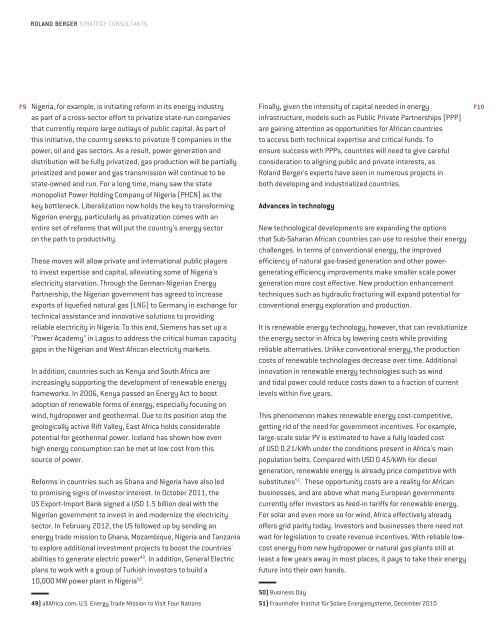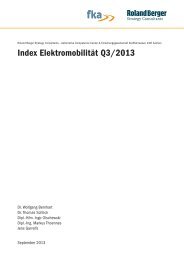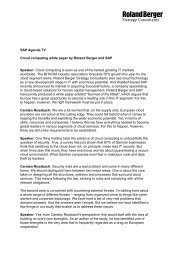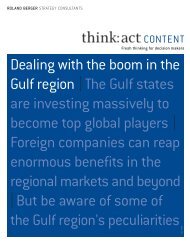think: act STUDY "Inside Africa" - Roland Berger
think: act STUDY "Inside Africa" - Roland Berger
think: act STUDY "Inside Africa" - Roland Berger
You also want an ePaper? Increase the reach of your titles
YUMPU automatically turns print PDFs into web optimized ePapers that Google loves.
<strong>Roland</strong> <strong>Berger</strong> Strategy Consultants<br />
f9<br />
Nigeria, for example, is initiating reform in its energy industry<br />
as part of a cross-sector effort to privatize state-run companies<br />
that currently require large outlays of public capital. As part of<br />
this initiative, the country seeks to privatize 9 companies in the<br />
power, oil and gas sectors. As a result, power generation and<br />
distribution will be fully privatized, gas production will be partially<br />
privatized and power and gas transmission will continue to be<br />
state-owned and run. For a long time, many saw the state<br />
monopolist Power Holding Company of Nigeria (PHCN) as the<br />
key bottleneck. Liberalization now holds the key to transforming<br />
Nigerian energy, particularly as privatization comes with an<br />
entire set of reforms that will put the country's energy sector<br />
on the path to productivity.<br />
These moves will allow private and international public players<br />
to invest expertise and capital, alleviating some of Nigeria's<br />
electricity starvation. Through the German-Nigerian Energy<br />
Partnership, the Nigerian government has agreed to increase<br />
exports of liquefied natural gas (LNG) to Germany in exchange for<br />
technical assistance and innovative solutions to providing<br />
reliable electricity in Nigeria. To this end, Siemens has set up a<br />
"Power Academy" in Lagos to address the critical human capacity<br />
gaps in the Nigerian and West African electricity markets.<br />
In addition, countries such as Kenya and South Africa are<br />
increasingly supporting the development of renewable energy<br />
frameworks. In 2006, Kenya passed an Energy Act to boost<br />
adoption of renewable forms of energy, especially focusing on<br />
wind, hydropower and geothermal. Due to its position atop the<br />
geologically <strong>act</strong>ive Rift Valley, East Africa holds considerable<br />
potential for geothermal power. Iceland has shown how even<br />
high energy consumption can be met at low cost from this<br />
source of power.<br />
Reforms in countries such as Ghana and Nigeria have also led<br />
to promising signs of investor interest. In October 2011, the<br />
US Export-Import Bank signed a USD 1.5 billion deal with the<br />
Nigerian government to invest in and modernize the electricity<br />
sector. In February 2012, the US followed up by sending an<br />
energy trade mission to Ghana, Mozambique, Nigeria and Tanzania<br />
to explore additional investment projects to boost the countries'<br />
abilities to generate electric power 49 . In addition, General Electric<br />
plans to work with a group of Turkish investors to build a<br />
10,000 MW power plant in Nigeria 50 .<br />
49) allAfrica.com: U.S. Energy Trade Mission to Visit Four Nations<br />
Finally, given the intensity of capital needed in energy<br />
infrastructure, models such as Public Private Partnerships (PPP)<br />
are gaining attention as opportunities for African countries<br />
to access both technical expertise and critical funds. To<br />
ensure success with PPPs, countries will need to give careful<br />
consideration to aligning public and private interests, as<br />
<strong>Roland</strong> <strong>Berger</strong>'s experts have seen in numerous projects in<br />
both developing and industrialized countries.<br />
Advances in technology<br />
New technological developments are expanding the options<br />
that Sub-Saharan African countries can use to resolve their energy<br />
challenges. In terms of conventional energy, the improved<br />
efficiency of natural gas-based generation and other powergenerating<br />
efficiency improvements make smaller scale power<br />
generation more cost effective. New production enhancement<br />
techniques such as hydraulic fr<strong>act</strong>uring will expand potential for<br />
conventional energy exploration and production.<br />
It is renewable energy technology, however, that can revolutionize<br />
the energy sector in Africa by lowering costs while providing<br />
reliable alternatives. Unlike conventional energy, the production<br />
costs of renewable technologies decrease over time. Additional<br />
innovation in renewable energy technologies such as wind<br />
and tidal power could reduce costs down to a fr<strong>act</strong>ion of current<br />
levels within five years.<br />
This phenomenon makes renewable energy cost-competitive,<br />
getting rid of the need for government incentives. For example,<br />
large-scale solar PV is estimated to have a fully loaded cost<br />
of USD 0.21/kWh under the conditions present in Africa's main<br />
population belts. Compared with USD 0.45/kWh for diesel<br />
generation, renewable energy is already price competitive with<br />
substitutes 51 . These opportunity costs are a reality for African<br />
businesses, and are above what many European governments<br />
currently offer investors as feed-in tariffs for renewable energy.<br />
For solar and even more so for wind, Africa effectively already<br />
offers grid parity today. Investors and businesses there need not<br />
wait for legislation to create revenue incentives. With reliable lowcost<br />
energy from new hydropower or natural gas plants still at<br />
least a few years away in most places, it pays to take their energy<br />
future into their own hands.<br />
50) Business Day<br />
51) Fraunhofer Institut für Solare Energiesysteme, December 2010<br />
f10

















